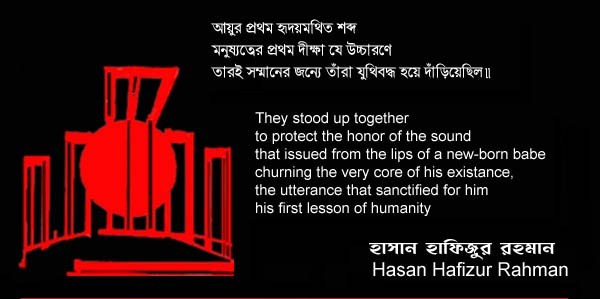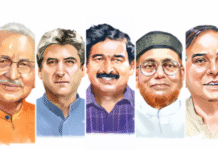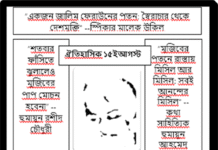This is an Ekushey like most others before. Although all our Ekusheys are located in political spaces adorned by cultural symbols, it has always been an event which we celebrate and welcome to renew our worn pledges to nationhood. Pledges we defied and ignored. Although in 1952, the events seemed more about the rights of Bangla as one of the state languages, the message was clear that it was a call for equal space in the governance of Pakistan. The language issue was a vehicle but the passengers on that bus were of resistance, rebellion and death — asking for equal status. It was denied by Pakistan and that kicked off a long movement which ushered in 1971. It is best to remember that the arrows of history fly long before the bow is drawn. What does Ekushey 2014 mean to us now from that perspective?
* * *
Bangladesh has created for itself and now faces political challenges that indicate that hard times will be all around for some time to come. There are many incremental reasons for the crisis we face today but our history has been so devoid of democratic experiences that we simply have not learnt to speak its language. It’s neither ironical nor absurd that the Ekushey which was a struggle for democracy in so many spheres have travelled down to areas where that is the last concern. Bangladesh throttles democracy and swears by it at the same time. After 42 years of independence we are our worst embarrassment, politically. Celebrating Ekushey has meant we are on the verge of celebrating our collective failures.
* * *
Bangladesh mourns 1975, celebrates 1990 and doesn’t know what to say about what came after that. It’s hardly a record of rule which has shown the path to democracy and pluralism but what is scary is our lack of interest in it. Political violence, both structural and incidental, has taken over and the general idea is that if we can get on top of the enemy no matter how, nothing else matters. It’s interesting that this has intensified since 1990 when the so-called ‘democratic’ phase was inaugurated. Perhaps a fitting diagnosis of our situation is that the man who was the symbol of dictatorship, the ultimate ‘Shoiroshashok’ now sits in the parliament to ensure the role of a democratic Opposition which was possible only by including Jatiya Party as a government partner. In the end, it’s this triumph of Ershad over history, the so-called democratic parties, which testifies to what we really are. Should we not then question the content of what we mean by ‘democracy’ and its victories?
* * *
The last two years of course have been very restive and also one of the most cynical phases in our political life but then we never had better days; we only have less worse and the worst of days, politically. Bangladesh’s founder leader found it impossible to run Bangladesh with an Opposition in place and ended up establishing one-party rule. It may be an admission of administrative inability only in some eyes, but it also meant lack or dearth of faith in democratic rule and systems. The series of martial laws that followed are closely linked to the hidden power conflicts within various sections of the ruling classes and reflect the lack of democratic space and practices. Martial law endorsed and formalised the process that began with one-party rule. Both killed pluralistic democracy in the name of political management and patriotism.
* * *
But what it had birthed was the child of cynicism from inside the system. The new leader General Zia opened the doors for the entry of Jamaat-e-Islami, the party of traitors to create an anti-AL alliance. This formalised the method of taking any convenient steps to hang on to power and so many years later, our politics is based on whom we like less not which party we like more. It has become a policy of negative stances, opportunistic decisions and method to hang on or go to power. Who can then ever say who believes in democracy or the spirit of 1971? Our ruling class may well be bereft of all of them.
* * *
If February 1952 was a matter of demanding the right to a language, our mother tongue, this year – 2014 — must be one for the right to speak, the practice we have forgotten. Or the right we never got. Our treacherous lack of confidence in democratic institutions has made us forget that the principal purpose of political communication is to ensure that there are rights for all. Yes, the Shaheed Minar is a great reminder of the struggle and the symbol of our cultural movement and the Boi Mela a wonderful way to throng in crowds to celebrate books even if not to buy or read them; but the fact remains that it was fundamentally a political struggle that began years back in the midst of the partition of Bengal and is the code by which the East Bengali peasant identity will always be marked.
* * *
Among the significant things we have done in the last few years is to pass laws that have ensured political instability beginning with the 15th amendment. We have seen a resistance to that in the shape of the most violent of agitations which targeted ordinary people. We now have a parliament which nobody bothers or cares about. It’s nearly the nil point of democracy if possible. Of course one can argue that the Upazilla polls are on and in the first phase the Opposition has done better than the Government party and even the pariah dog of national politics, Jamaat has won a few seats so there is hope but does it all in any way end up to a functional democratic regime or more agitation, particularly a strengthened opposition? What are we transiting to? We won our right to speak in Bangla but we wilfully forgot the language of democracy.
————————————
Samia R. Karim is an Australia based professor of politics and policy.
Source: bdnews24










